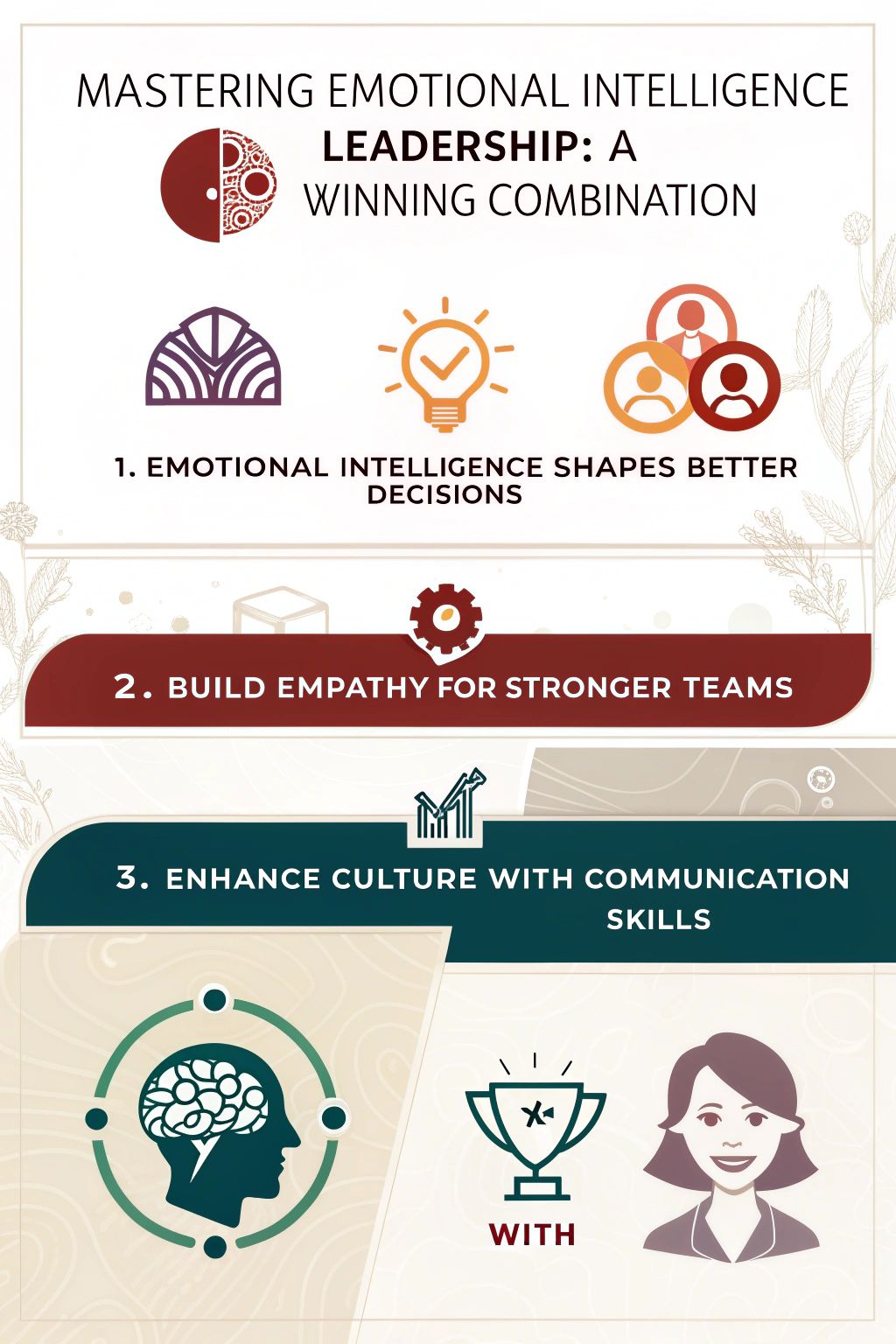Several leaders experience difficulty in establishing a profound connection with their teams. The challenges often lie in managing disagreements, inspiring team members, or cultivating a favourable work environment.
It is here that fusing emotional intelligence and leadership garners significance. Worth acknowledging is that 71% of employers prioritise emotional intelligence over technical skills while recruiting new personnel.
Through our article, you will comprehend how the amalgamation of emotional intelligence and effective leadership can change the way you handle individuals. You will acquaint yourself with the five primary elements of emotional intelligence and their role in shaping you into a more competent leader.
Prepare for a transformation in your approach, and inspire the same in your team. Continue to read for more insights.

Understanding Emotional Intelligence in Leadership

Emotional intelligence in leadership is essential for the effectiveness of leaders. It plays a vital role in comprehending, controlling emotions, and enhancing interpersonal skills within an organisation.
Definition of Emotional Intelligence
Emotional intelligence, or EQ, involves understanding and managing your own feelings. At the same time, you need to recognise and influence how other people feel. This skill is key for leaders who aim to be effective and bring out the best in their teams.
John Mayer and Peter Salovey first talked about this idea in 1990. Later, Daniel Goleman wrote about it in his Harvard Business Review article in 1998. He said that having a high EQ is essential for good leadership.
Leaders with strong emotional intelligence can handle pressure well. They also make smart decisions because they understand their emotions and those of others around them. This ability helps them solve problems before things get too bad.
True leadership relies on these skills to foster a positive work environment where everyone feels valued and understood.
Importance for Leaders
Having high emotional intelligence is vital for leaders. The skill allows them to maintain composure during stressful situations, promptly rectify issues and empathise with others.
Research by TalentSmart indicates that emotional intelligence surpasses all other determinants of job performance. Indeed, 71% of employers currently favour it over technical skillsets during recruitment procedures.
Leaders possessing this ability can successfully manage their emotions as well as those of their team members.
Goleman, associated with Harvard Business Review, suggests that exceptional leaders have one aspect in common: profound emotional intelligence. They possess self-awareness and can accordingly modulate their actions.
Such leaders also empathise with their team’s emotional state and necessities, enabling easier motivation and guidance towards objectives. This ability contributes to building robust team bonds and enhances the collaborative efficiency within an organisation.
Core Components of Emotional Intelligence
Comprehending Emotional Intelligence in Leadership involves mastering its core components, such as self-awareness, self-regulation, empathy, and social skills.
Leaders need to have the capacity to recognise and regulate their own emotions, as well as comprehend the viewpoints of others to effectively motivate and cultivate positive relationships within the organisation.
Self-Awareness
Self-awareness stands at the heart of emotional intelligence. It means knowing your strengths, weaknesses, and feelings. Tasha Eurich’s research found a shocking fact: while 95% of people think they are self-aware, only 10-15% truly are.
This gap shows many overestimate their ability to understand themselves. Leaders who master self-awareness can make better decisions and have a clear view of their impact on others.
Using tools like 360-degree feedback helps leaders gauge how others see them versus their self-perception. This method shines a spotlight on areas for improvement and boosts team success by cutting down stress and lifting motivation.
True self-assessment is hard but key for those ready to take their leadership skills forward.
Self-Management
Self-management remains a crucial component of emotional intelligence for leaders. It includes regulating individual emotions and instincts, particularly under pressurised circumstances.
Leaders who are proficient in self-management maintain an optimistic perspective, enhancing their efficiency. They prioritise reflection before taking action and solicit aid when required.
Leaders lacking this ability often respond on impulse, potentially escalating tension and reducing inspiration within their teams. To circumvent these obstacles, adoption of methods like thinking before acting and constructing a support network is of great importance.
This method aids not only in handling personal emotions but also in decision-making and settling disputes within a team or an establishment.
Social Awareness
Understanding team members’ emotions and the dynamics within an organisation is a significant element of leadership – it’s all about social awareness. Leaders who are socially aware can effortlessly identify the feelings of others and navigate complex organisational relationships.
This skill is instrumental in crafting a positive workspace where everyone feels appreciated and validated. Research by the Center for Creative Leadership highlighted that managers who can deftly identify their team’s emotions tend to be viewed as more effective leaders.
This component of emotional intelligence holds a central position in running triumphant teams. Empathy, which is ranked as the most significant leadership skill by DDI, has a direct influence on the competency of leaders.
Through enhancing their social awareness, leaders can facilitate superior cooperation, increase employee engagement, and uplift the overall morale within their organisation. This also allows them to become proficient at non-verbal communication, interpreting body language signals that support them in forming deeper connections with others.
Relationship Management
Leaders need to manage relationships well. This helps teams work better together and increases collaboration. Good relationship management lets leaders coach, mentor, and sort out conflicts efficiently.
A survey by the Society for Human Resource Management showed that 72% of workers think respectful treatment is top for job satisfaction.
Effective leaders use emotional intelligence to handle team dynamics positively. They pay attention to non-verbal signals and practise active listening. This leads to a workspace where everyone feels valued and understood.
Unaddressed conflict takes away about 8 hours of productivity per issue in organisations. So, managing relationships well not only boosts morale but also saves time and resources.
Emotional Intelligence with Examples
Emotional intelligence holds a significant place in leadership. It incorporates self-awareness and self-regulation of one’s emotions and also the capacity to perceive and impact the emotions of others.
For instance, leaders possessing advanced emotional intelligence can maintain their composure under stress. They manage tense situations without losing their equilibrium. This ability is key in defusing team conflicts effectively.
Think about managers who genuinely comprehend their team’s requirements and viewpoints. A study from the Center for Creative Leadership highlights that these managers outperform in their work.
They pay careful attention and utilise non-verbal signals to express their understanding, which fosters confidence and enhances communication among team members. Plus, team members who display a higher degree of emotional intelligence reciprocate with more understanding, smoothing the way for difficult discussions without exacerbating problems or miscommunications.
Integrating Emotional Intelligence in Leadership
Integrating emotional intelligence in leadership enhances team dynamics and improves organisational culture by fostering positive relationships. Leaders with high emotional intelligence skills are better communicators and have the ability to inspire and resolve conflict within the organisation.
Enhancing Team Dynamics
Improving team dynamics is vital for effective leadership and organisational success. A higher EQ promotes positive team dynamics, collaboration, and productive relationships. Leaders with high levels of emotional intelligence communicate better and can resolve conflicts more effectively, contributing to a more transparent, productive, and respectful workplace.
Unresolved conflict can cost organisations about 8 hours of productivity per issue.
Leadership effectiveness is associated with emotional intelligence, particularly during challenging times. Integrating emotional intelligence into leadership improves the synergy within the organisation by promoting positive team dynamics and enhancing organisational culture.
Managers who demonstrate more empathy towards direct reports are seen as better team players. Overall, enhancing team dynamics through emotional intelligence is a critical skill that leads to successful leadership while also boosting employee morale and overall performance.
Improving Organisational Culture
Effective leadership is vital in enhancing organisational culture. Emotional intelligence plays a pivotal role in shaping the work environment, as it enables leaders to build meaningful connections and enhance team dynamics.
Research from the Society for Human Resource Management highlights that 72% of employees prioritise respectful treatment, emphasising the significance of a positive work culture. Engaged employees have been proven to exhibit higher productivity levels, ultimately contributing to organisational profitability.
By integrating emotional intelligence into leadership strategies, organisations can cultivate an environment that fosters psychological resilience and empowers individuals to perform optimally even amidst challenges.
Emotional intelligence equips leaders with the ability to recognise and manage emotions efficiently, thereby positively influencing organisational conflict resolution. This skill also facilitates effective communication and decision-making processes within teams.
By embracing emotional intelligence as a fundamental element of leadership development, companies can elevate their overall organisational culture and create a supportive framework for employee well-being.
Conclusion
Mastering emotional intelligence is crucial for effective leadership, as it improves interpersonal relationships and fosters positive team dynamics. Developing social skills and practising empathy are pivotal components of emotional intelligence.
Leaders who prioritise emotional intelligence can effectively handle stress, resolve conflicts, and respond with empathy. By incorporating emotional intelligence into their leadership style, individuals can become more influential leaders, ultimately driving success in their teams and organisations.
Research emphasises the importance of emotional intelligence in the workplace, highlighting its role as a key factor in predicting employee performance.
MindOwl Founder – My own struggles in life have led me to this path of understanding the human condition. I graduated with a bachelor’s degree in philosophy before completing a master’s degree in psychology at Regent’s University London. I then completed a postgraduate diploma in philosophical counselling before being trained in ACT (Acceptance and commitment therapy).
I’ve spent the last eight years studying the encounter of meditative practices with modern psychology.

